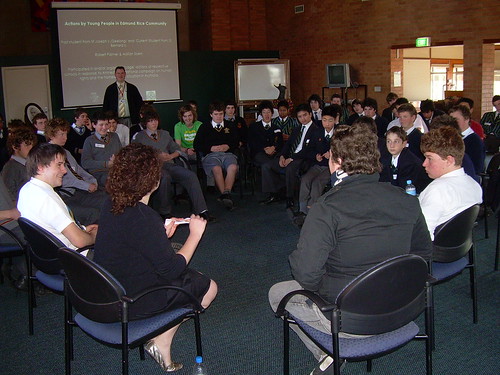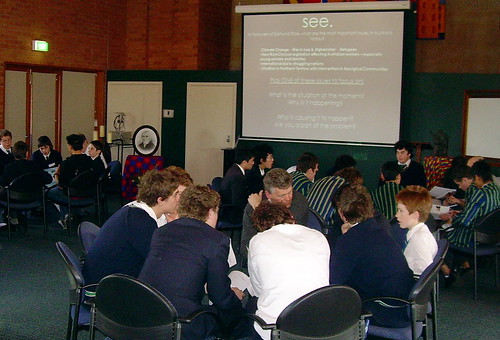29 August 2007
STUDENTS URGED TO ACCEPT RESPONSIBILITY TO ACT FOR JUSTICE
They were also encouraged to strive to ensure that their school communities placed a priority on educating for justice and were not solely focused on academic and sporting success.
The seminar was addressed by Mearon O’Brien, a past student of St James’ Brisbane, currently employed full-time with the Young Christian Worker Movement
Mearon spoke of her personal involvement with the Edmund Rice Network which had nurtured her passion for justice, and challenged students to develop an awareness and sensitivity to injustice (See), reflect on the reasons for the existence of that injustice in the light of the gospel (Judge) and to join with others to work to change the situation (Act)
Students also listened to a number of current and former students of Edmund Rice schools in Melbourne who were interviewed about a variety of justice initiatives that they had undertaken in their school or of their ongoing involvement in justice activities after leaving school.
Students then met in school groups to plan actions in their respective schools.
MAKE FISHING FAIR
As well as being another example of unfair trade, it is destroying the oceans.
Already, 90% of big fish like tuna and marlin are gone. If nothing changes, it is predicted many fish populations will collapse beyond recovery, destroying ecosystems and harming the one billion humans who rely on fish as their main source of protein.
Next month, the WTO will come forward with a new proposal for global fishing rules. This month, the WTO is talking to finance ministers around the world about what those rules should be. That provides a critical window for concerned citizens to make a stand by telling their trade ministers to oppose subsidized over-fishing and support fairness and sustainability for generations to come.
You can add your name to an online petition at the above website.
NATIONAL CLOSE THE GAP DAY – 18TH SEP
Aboriginal and Torres Strait Islanders die 17 years earlier than non-Indigenous Australians. Infant mortality amongst Aboriginal and Torres Strait Islanders is three times that of non-Indigenous Australians. The most recent budget gave just $30 million per year for Indigenous health funding - less than 10% of the $460 million that is required according to the Australian Medical Association.
At the same time the government has recently announced it now expects a $17.3 billion surplus in the current budget almost $4 billion dollars more than predicted in May.
September 18th has been designated as National Close the Gap Day which will give Australians across the nation the opportunity to come together and show their support for closing the 17-year life expectancy gap between Aboriginal and Torres Strait Islanders and other Australians.
See the above website for actions that are taking place in cities around the country on that day.
ARE GM FOODS THE ANSWER?
In a recent article published in Eureka Street Fr Charles Rue argues that the long term health effects of GM foods is untested and that the move remove the bans on the growing of GM crops is being driven by the economic interests of biotech companies.
A fuller discussion of the risks and benefits associated with GM foods can be found here
14 August 2007
IS RACISM AGAIN BEING EXPLOITED FOR ELECTORAL PURPOSES?
It is disturbing therefore to learn of the abuse and intolerance directed towards many of the more than two thousand Indian-born doctors currently working in Australia in the wake of the suspicions (seemingly based on rather dubious evidence) about Dr Mahommed Haneef’s alleged association with terrorists.
Of greater concern is the failure of members of the government to make any statement of support acknowledging the contribution being made to the community by these doctors, despite the plea from a joint delegation of the United India Association (UIA) and Overseas and Australian Medical Graduates Association (OAMGA) to do so. See here for the news report.
It would be hoped that racism was not again being exploited as an issue in an attempt to win the election scheduled before the end of the year.
CATHOLIC BISHOPS URGE POLITICAL ENGAGEMENT
In making their statement the Bishop’s drew upon the social justice tradition of the church which emphasizes respect for human dignity, the service of the common good and a particular concern for the poor, sick, marginalized and forgotten in society, as well as its long experience as a major provider of education, health and social services in this country.
The Bishop’s identified respect for life, support for the family, justice for indigenous Australians, education, health, care for the environment, just treatment for refugees and asylum seekers and peace as key issues to be considered when casting a vote.
Rather than seeing religious faith as being removed from politics the bishops urged Catholics to become fully engaged in the political process.
The full text of the bishops statement is available for download at the above website.
TIME TO PROTECT OUR HUMAN RIGHTS?
Increasingly concerns are being raised about the vulnerability of fundamental rights enshrined in the Universal Declaration of Human Rights in Australia.
Rights such as the right to a fair trial, the right to the presumption of innocence, the right to be free from arbitrary arrest and imprisonment, the right to freedom from torture and cruel and degrading treatment, the right to privacy and the right to seek and enjoy asylum in another country are all seen to be under threat given that Australia is the only western country without a national human rights act or equivalent.
Australia has no mechanism to ensure that the United Nations Conventions to which it is signatory are incorporated into domestic law. Up until now the good intentions of the government have been assumed.
Recent examples such as those mentioned above have given new impetus to the campaign for the introduction of a Human Rights Act in Australia similar to that which was introduced in the United Kingdom in 1998.
ACTION NEEDED ON POVERTY, NOT PROMISES
The Vatican statement indicated that the "time for simple promises has passed" and pointed out that governments repeatedly have pledged to dedicate the equivalent of 0.7 per cent of their GNP to development assistance. It went on to say"If that pledged target amount was achieved, a total of US$192 billion would be made available annually" instead of "the US$78.6 billion presently being made available."
The statement added that "A new starting point, built upon renewed political will, the mobilisation of efforts and resources and the shaping of a true, recognisable and viable global partnership for development should be welcomed and fostered by everyone"

